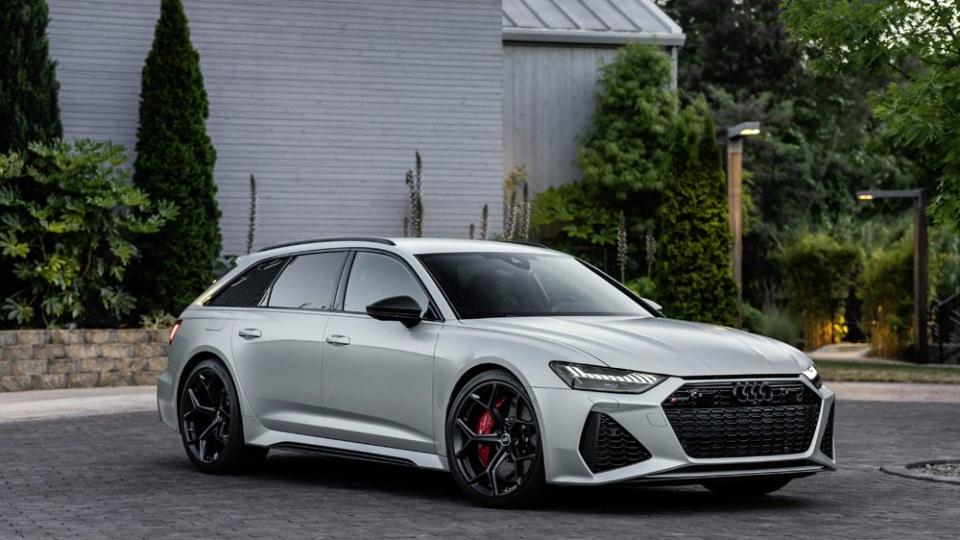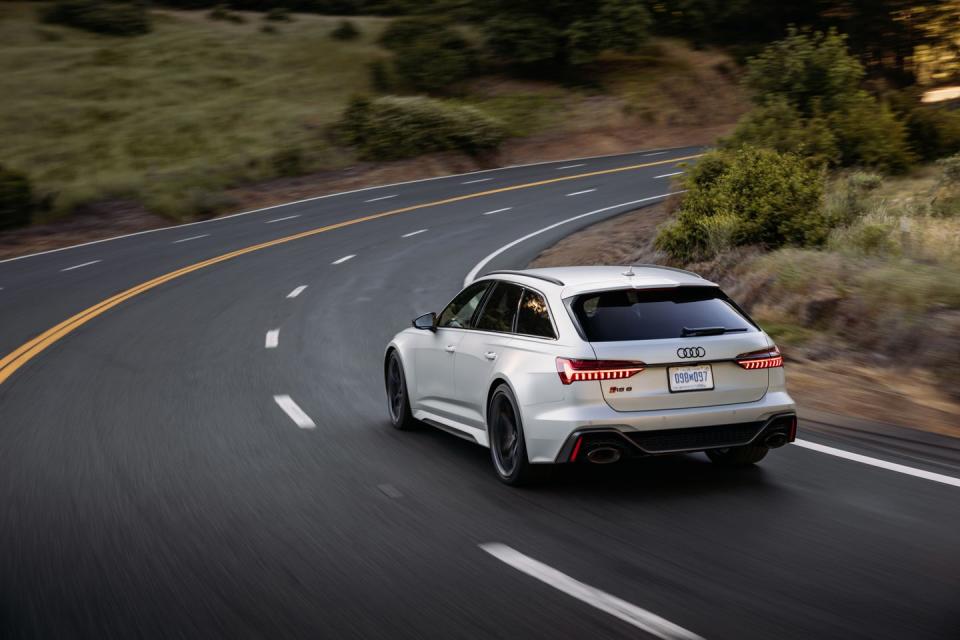2024 Audi RS6 Avant Performance Wagon Has More Bite

Wagons are a hard sell in the U.S. It isn't because most people want an SUV (although they do). Nor is it that the sight of a longroof triggers PTSD from years of sibling abuse in the side-facing third row of Dad's Country Squire (although it can). It's that the market doesn't make sense. Take the Audi RS6 Avant. It and the A6 Allroad launched for 2021, and the nearly one-third pricier RS6 outsells the A6.
They're a hardcore bunch, those wagon buyers. And while the RS6 is wonderfully powerful and dynamically competent, it was a little too quiet, a little too refined, and a little too soft. They wanted an even more sharp-edged machine. For the 2024 model year, Audi listened to its customers and rolled out the updated model, now dubbed RS6 Avant Performance.
The new RS6 Performance loses some sound insulation and gains 30 horsepower and 37 pound-feet of torque. The bump for the twin-turbo 4.0-liter V-8, now making 621 horsepower and 627 pound-feet, comes courtesy of a larger turbocharger impeller and new engine mapping. Peak boost is up to 23.2 psi from 20.3. The added boost comes with no additional lag. The hot-V engine instantly responds to throttle inputs, while the ZF-sourced eight-speed automatic benefits from snappy downshifts that are claimed to be quicker. Audi engineers also reworked the Torsen limited-slip center differential to help squelch understeer. The reduction of sound insulation on the firewall removes some isolation and gives the engine a larger bark inside. If that's still not enough, there's an available RS sport exhaust that's even louder.

The added power should be enough to knock the 60-mph time below the 3.0-second threshold—that won't quite unseat the BMW M5 as quickest in the class, but the RS6 will no longer be one of the slowest. We're talking a tenth of a second here, maybe two, but bragging rights are important.
Don't get caught up in this car's numbers; how it feels is more important. New 22-inch Y-spoke wheels and Continental Sport Contact 7 tires cut 11 pounds versus the standard 21-inchers. And if you really want to reduce the unsprung mass, opt for the carbon-ceramic brake package, which takes nearly 17 pounds off each corner. The trade-off is a touchy brake pedal—or at least they have a learning curve we never quite mastered in our short drive in Napa Valley, but based on our experience with ceramic rotors in other VW Group cars, we think we'd acclimate to them, eventually.
With or without the optional brakes, the reduced unsprung mass transforms the steering from fairly muted to something with genuine feedback. The roughly 4900-pound wagon still carries its V-8 completely fore of its front axle line, and understeer is effectively restrained on a canyon blast. That is until you're going too fast for the corner. The Continentals have lots of grip, and when stability control intervenes, it's a gentle nudge that doesn't kill the rhythm or make your passengers think you can't drive.
While the RS6 launched in the U.S. solely with air springs, the sportier Dynamic Ride Control (DRC) suspension quietly joined the option sheet a year later for 2022. It resists pitch and roll with hydraulics, but when an individual wheel moves, such as in a pothole, the hydraulics don't increase compression resistance. Only when both wheels on an axle (such as during acceleration or braking) or on one side (during cornering) move in phase do the hydraulics keep the body plum. If you're planning to track an RS6, DRC is worth the upcharge, but the stiffly sprung steel coils don't come close to the comfort of the standard air springs.
Visually speaking, the RS6 Avant Performance isn't that different from its predecessor—the bumpers are tweaked a bit, and the exterior trim elements are now finished in matte gray. What you'll notice more are the visual options: four different wheel finishes, three different mirror caps, three interior stitching colors, and three brake-caliper colors give plenty of combos. A Bronze Edition, limited to just 75 examples, combines bronze-colored wheels with pearl black paint that delivers a striking curb presence.

It is worth noting that the mechanically identical RS7 Sportback Performance is also available, but for some reason, it's $2000 more. Even at $126,895 for the RS6, Audi will surely sell as many as it cares to send over. But how about a moderately priced sporty wagon for the middle class? Maybe that would be too rational for this market.
You Might Also Like

 Yahoo Autos
Yahoo Autos 